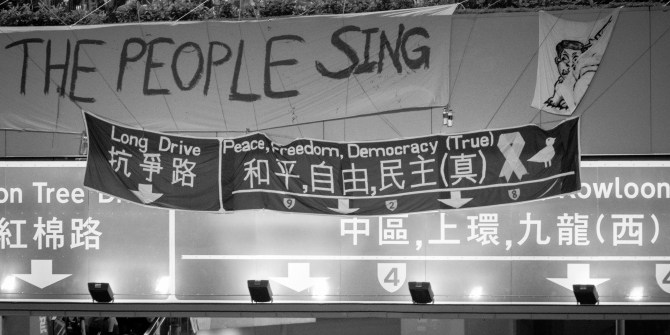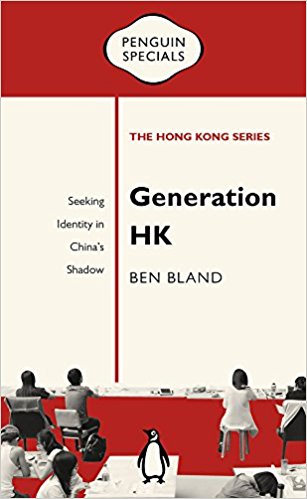A new contribution to the Penguin Specials Hong Kong series, in Generation HK: Seeking Identity in China’s Shadow author Ben Bland offers a pocket-sized investigation into Hong Kong’s up-and-coming generation. This is a welcome and easily digestible introduction to the political and social issues Hong Kongers are grappling with today, expressed through engaging prose focused on people rather than statistics, writes Thomas Kingston.
This book review has been translated into Mandarin by Nick Ackert, Alessandro Burrone and Sarah Shing Tzi Chang and proof-read by Fei Yuan (Mandarin LN808-2, teacher Fei Yuan) as part of the LSE Reviews in Translation project, a collaboration between LSE Language Centre and LSE Review of Books. Please scroll down to read this translation or click here.
Generation HK: Seeking Identity in China’s Shadow. Ben Bland. Penguin. 2017.
From an early age Hong Kong has played a central role in my deep-rooted curiosity about the world. Whether it was the Tai-Pan saga of novelist James Clavell or the excellent history by Steve Tsang, any reading material was devoured. As I grew older, the attraction to Hong Kong was converted into a succession of visits to this enclave of towering concrete and emerald hills. Earlier this year I had the pleasure of visiting Hong Kong as a guest of the Democratic Party – a stalwart of the ‘Pro-Democracy’ camp. What made this extra special was that it was the time of the Chief Executive election – I was able to witness and explore first-hand the competing identities at play in Hong Kong.
These identities are far more than being pro/anti-Beijing and are also deeper than young/old – with some of the most prominent ‘pro-democracy’ activists being those who had previously protested about the lack of democracy when HK was a British colony. However, a new generation of Hong Kongers has come to the forefront, similar in some ways but radically different in others. I use the word ‘radical’ as these people are trying to find their place in the twenty-first century and, with no real memory of the British but a definite disassociation with the mainland, they seek radical answers to key questions of identity.
This is where Ben Bland’s Generation HK: Seeking Identity in China’s Shadow comes in, a beautifully presented contribution to the Penguin Specials series on Hong Kong. At just 126 pages, it is perfect, as the blurb says, for reading on your lunch hour or at bedtime. Bland, South China correspondent for the Financial Times, brings a combination of academic analysis, grassroots insight and longstanding interest to the field with this pocket-sized investigation into what Hong Kong’s up-and-coming generation are all about.
Exploring the different layers of the ‘HK Generation’ – who, Bland explains, are set apart from their parents by mainly being HK-born – we start with a series of interviews with the leaders of the Student Movement. Joshua Wong is probably the most recognisable political individual in Hong Kong right now, not only for grabbing recent headlines across the globe for being in and out of prison on charges related to his role in the protests, but also for having spawned a Netflix documentary and being invited for meetings with various high-ranking US politicians. This, Bland explains, led to the Beijing government portraying him as a puppet of outside interests and flexing their huge soft power to limit his travel plans, with Malaysia and Thailand both refusing entry and deporting him.
Bland charts the development of disaffection with mainland-imposed regulations and policies, of which Wong has been at the forefront since the early 2010s, and also explores the backgrounds of Agnes Chow, who dropped out of the Umbrella Movement protests due to alleged threats against her family, and Nathan Law, who, being born in Shenzhen on the mainland, has experienced life on both sides of the border. In this section, Bland’s journalistic background shines through – rather than a dry political analysis, these are depictions of humans with their fragilities and passions clearly illustrated in easily digestible and flowing prose.
 Image Credit: Umbrella Revolution, Hong Kong, 2014 (Willy AuYeung CC BY SA 2.0)
Image Credit: Umbrella Revolution, Hong Kong, 2014 (Willy AuYeung CC BY SA 2.0)
Bland’s decision to avoid this becoming an overtly political study is made clearer when the next chapter tackles a different phenomenon. ‘Tiger Mothers’, thanks to much press coverage and a number of books, are well-documented in the West now, and so is the intense pressure of South Korean and Japanese examination systems. Hong Kong and its super tutors seem to have escaped this attention, but after reading this chapter I’m perplexed as to why. Due to the highly competitive nature of the HK university system, the desire to get in is key, and that’s where these tutors come in – teaching cramming classes and webinars to thousands of students each year, they have near-celebrity status in HK, their carefully coiffed profiles on hundreds of billboards and buses. With one tutor being offered eleven million US dollars per year to change institutions, it’s clear that big money is involved. The inclusion of the super tutors element isn’t just about the individuals tutoring: instead, it provides context for the previous chapter, placing youth in a vice of both parental pressure to succeed as well as political pressure from the mainland for them to be more ‘Chinese’.
The next profile is that of the ‘Professional Democrats’. Whilst combining an active role in politics with a white-collar job might seem common in the UK, given the mainland owners of many HK companies and the continued success of businesses often depending on the continued good relations between Beijing and HK (i.e. further integration if possible), setting out your stall as an opponent of Beijing and a champion of localism might not seem the most obvious route for a Hong Konger. As Bland explains, their numbers are relatively few, but their motivation is telling: for instance, we meet politicians hoping to stop the flow of mainland immigration for fear of their culture and language being eroded (Cantonese and Traditional characters are a key part of the HK identity). This relatively populist stand isn’t unique to Hong Kong nor is the continued return to the issue of Hong Kong identity, seemingly viewed as a civilised culture (due to the belief in democracy etc) as opposed to the uncouthness of the mainlanders (their dropping of rubbish is an issue often brought up). Given the political nature of these individuals, it’s a shame that a counter-opinion wasn’t included from a Hong Konger less anti-Beijing, but it nonetheless offers remarkable insight into the individuals who are setting up their stalls for the decades to come.
Since a lot of wealth in Hong Kong depends on mainland trade, the richest are the least radical of the groups interviewed. Bland’s frustrations with their anonymous and noncommittal statements are clear throughout, but just at the end he hits on a goldmine. Bland interviews a leading figure within a Hong Kong think tank and the current head of the Commission on Youth, combining wealth with a PhD from Kings College, London. Bland paints a portrait of a professional and yet genuinely caring figure who offers some relatively strong-worded statements. This is perhaps my favourite encounter in the book as I can’t help but feel that with the combination of wealth, education and influence, his vision has the best chance of becoming reality. But sadly, when asked where he sees Hong Kong’s future heading, he’s not so optimistic: ‘If you extrapolate from the last ten years, then where it’s going is pretty horrible […] no one in their right mind will go out in public and say this is where it’s going.’
Disaffection is a key theme of this book, but the question of ‘what happens next’ remains undeveloped on the whole, until we reach the last chapter. Here, we meet those engaged in the struggle for complete independence from China: something supported by only 17 per cent of the population but 39 per cent of Generation HK. Rather than work in think tanks, organise colleagues or start political parties, these ‘bad boys’ are at the forefront of the scuffles and riots, burning Chinese flags and risking jail time. The most radical are barred from election and instead resort to proxy candidates (also subsequently banned). Despite their radical position and borderline association with violence, we see a really passionate group of people who seem to actually thrive on China’s restrictions of their actions, almost like rebellious children defying their parents’ instructions.
In this book, Bland manages to make personalities come to life: he brings their concerns and the general situation right into your living room/office/coffee shop and he makes the narrative about the people rather than the statistics. Yet, theory is present: the definition of Hong Kongers using mainlanders as the ‘others’ to find their own identity is a strong use of anthropological/sociological theory and links well with the collected interviews. All in all, this is a great short book, perfect for an introduction to the current situation and unafraid to tackle major issues. I am left wondering, however, as to what arguments the Pro-Beijing camp might make as the radical localists are a minority, even if they do have a loud voice. I look forward to seeing the rest of this series in the coming future.
Thomas Kingston is a postgraduate student at SOAS, University of London, reading for an MA in Pacific Asian Studies. Alongside this, having been awarded a Blackstone Entrance Exhibition from Middle Temple alongside the Vice Chancellor’s Scholarship from BPP Law School, he also studies the BPTC/LLM. Prior to this, he worked in human rights law in Cambodia and is a frequent visitor to East Asia. His research interests include concepts of ethnicity and their influence on state-building and the influence of Classical Chinese philosophy on contemporary politics, policymaking and society.
Note: This review gives the views of the author, and not the position of the LSE Review of Books blog, or of the London School of Economics.
《香港世代:中国影响下身份的追求》,白杰明,企鹅出版社,2017。
Review translated by Nick Ackert, Alessandro Burrone and Sarah Shing Tzi Chang and proof-read by Fei Yuan (Mandarin LN808-2, teacher Fei Yuan)
 企鹅出版社香港选集最新巨献,白杰明所作的《香港世代:中国影响下身份的追求》这本小书为读者提供了关于香港年轻人现状的调查。按照评论家托马斯·金士顿的意见,这本书不但很容易理解,而且会受到读者的欢迎。通过一对一的焦点采访(不依赖统计资料),白杰明通过有趣的调查向读者介绍了对香港社会ˎ 政治等等问题的探索。
企鹅出版社香港选集最新巨献,白杰明所作的《香港世代:中国影响下身份的追求》这本小书为读者提供了关于香港年轻人现状的调查。按照评论家托马斯·金士顿的意见,这本书不但很容易理解,而且会受到读者的欢迎。通过一对一的焦点采访(不依赖统计资料),白杰明通过有趣的调查向读者介绍了对香港社会ˎ 政治等等问题的探索。
托马斯·金士顿写道:我从小就对香港很感兴趣;为了满足我自己的好奇心,我渴望地读了詹姆斯·克拉韦尔的«大班丛书»和曾锐生写的优秀史书。长大以后,我对香港的热爱让我屡次探访这个水泥丛林和它绿宝石般的山地。今年初,我有幸收到香港的民主党 (民主派的核心)的访问邀请。那次访问特别有意思,因为正好在特首选举当中,所以我亲眼见证了也探索了香港政治体系的特色和它独特的身份矛盾。
白杰明所作的《香港世代:中国影响下身份的追求》很细致地探索了这些现象;给企鹅出版社香港选集提供了重要的贡献。这本书只有126页;内容很凝练,书内介绍有提到这本书是休息时侯可以读的好书。在这本秀珍版图书内,作为金融时报的采访记者,白杰明用他伶俐的学术分析ˎ 仔细的采访经验和他自己对这问题的兴趣来探讨香港年轻人面临的现实。
香港的身份问题一点都不简单;它不限于反对还是支持北京政府,或者是年轻人对老人的问题。有些香港思想最激进的民主派活动家过去(香港殖民地的时代)抗议英国的治理缺乏民主。但是现在有新的一代在领导民主活动。在有些方面,他们很象过去,可是在其他的方面,他们更激进。我用“激进” 这个词是因为他们没有英国殖民时代的记忆,只知道要和中国断绝来往。为了在21 世纪找出他们的身份,他们为关键的身份问题寻找一个激进的答案。
白杰明采访了许多人。他的探索说明了香港年轻人有很多不同层次。比方说,现在的“香港世代”不像他们的父母,是在香港出生长大的。他的探讨由对多次参与雨伞运动的学生领导黄之峰的采访开始。说到这些领导,黄之锋可能是香港最有名的。他的抗议活动和服刑不但引起世界媒体的兴趣,而且导致网飞制作了关于他的纪录片。美国的政府官员也请他去会晤。因为这些原因,北京控诉他是外国人的傀儡,并用中国的软实力来限制他的旅行计划;马来西亚和泰国都已经禁止他入境并且把他驱逐。”
 Image Credit: Umbrella Revolution, Hong Kong, 2014 (Willy AuYeung CC BY SA 2.0)
Image Credit: Umbrella Revolution, Hong Kong, 2014 (Willy AuYeung CC BY SA 2.0)
白杰明描绘了对大陆强制的法规与政策的不满情绪,比如黄之锋2010初以来为最前沿的活动之一,并且也探讨一些重要人物的背景,比如周庭和罗冠聪的案例。周庭由于对家人潜在的威胁而必须退出雨伞运动,而罗冠聪出生在深圳,且能够经历界线两边的生活。在这一部分,白杰明的新闻资历体现了出来——他做的并不是一个冷淡的政治分析,而是人即人本身的脆弱和激情的一种易于理解和流畅风格的描写。
第二部分谈的是另一个现象。白杰明没有把这项研究变成公开政治性的意愿。如今在西方,“虎妈”这一话题随着媒体的广泛报道以及许多相关书籍,已经变成了一个熟悉的话题,而韩国和日本的考试制度也是如此。香港和香港的超级课外辅导员好像没有受到同样的重视,可是读这一章使我对此很困惑。由于香港高等教育的高度竞争性,对进入大学的渴望是其关键的条件,而这正是辅导员角色之所在——在香港,每年塞满学生的教室以及网上课程让这些辅导员几乎达到明星的地位,他们完美的发型和侧影出现在好多广告牌和公共汽车上。一位补习机构一千一百万美元的薪资,就表明了补习机构有雄厚的资金。考虑到超级辅导员的因素不仅与个人辅导有关系的,而也为上一章会提供背景。事实上,父母望子成龙的压力以及大陆更加“中国化”要求的政治压力,使青年人处于一种恶性循环。
下一个人物就是“职业民主主义者”。在英国,把积极参加政治活动和从事白领职业混合在一起是一个常见的情况,不过由于很多香港企业的内地业主们以及以北京和香港的良好关系为很多公司带来了成功(即如果可能的话,加上一体化),表现出自己对北京的反对意见以及保守地域主义的两个立场,好像未来在香港人眼前并不清晰。如白杰明所说,虽然前者的数量相当少,其理由还是有力的,例如,因为怕我们和政治家会面时希望他们将会停止从内地来的移民,因为怕他们文化的语言会受到损害/被削弱(广东语和繁体字是香港认同感的一个关键部分)。这个相当民粹主义的立场其实不限于香港,也不仅是传说中的内地人粗鲁行为(他们扔垃圾的问题经常被提出)不同的视为文明型文化的香港认同问题的延伸 (因对民主的信念等)。由于这些人的政治本性,很可惜的是,作者没有包括一个不那么反对北京政府的香港人,不过反正本书对这些正在表明未来的立场的人来说,很有洞察力。
因为香港大量的财富取决于和内地的贸易,所以最富有的群体是受访人中最不激进的。白杰明对他们匿名和不置可否的陈述有一种挫败感,这很明显。白杰明访问香港智囊团的领导人物,也是青年发展委员会的现任主管,将财富与伦敦国王学院的博士学位结合。白杰明描述了一位专业和真心关心、能提出一些措辞很强硬的声明的人。这也许是我在书中最喜欢的一部分,因为我不禁感到,通过财富、教育和影响力的结合,他的愿景最有可能成为现实。但遗憾的是,当有人问及他认为的香港未来的发展方向时,他并没有那么乐观:“如果你从过去十年推算,那它未来的发展方向是挺可怕的 […] 没有一个心智正常的人会在大庭广众之下说这是它的发展方向。”
“疏离”是这本书的一个重要主题,但是“接下来会发生什么”这个问题总体上还没有成体系,直到我们来到最后一章。在这一章,我们遇到了那些为香港完全独立于中国而奋斗的人:一个仅有17%的人口支持,但却有39%的香港世代支持的事业。这些“坏男孩”不在智囊团工作,不组织同事或组成党派,而是在打架和暴乱的最前列,焚烧中国国旗并冒着入狱的风险。最激进的那些人被禁止参选,并诉诸选择代理候选(最终也被禁止参选)。尽管他们有激进的立场和与暴力的边缘关系,我们还是可以看到一群真心热情的人;他们似乎真正地在中国对他们行为的限制中茁壮成长,几乎就像叛逆的孩子无视父母的指示。
在这本书里,白杰明试着把人物变得生动:他把他们的担忧和总体情况带进你的客厅/办公室/咖啡店,也讲述了平民百姓的故事而不是统计数据。但是理论部分也有:使用内地人作为“他人”来寻找自己身份的香港人的定义是利用人类学/社会学理论而与收集的访谈恰到好处地联系起来的。总而言之,这是一本很好的小书,非常适合介绍目前的情况,作者并不怕谈论重大问题。但是我不禁还要问:建制派可能会提出什么样的点子?因为激进的本市派还是少数派,即使他们声音有多么大。我期待在未来能看到本系列的其余部分。
托马斯·金斯敦是伦敦大学亚非学院的研究生,正在读太平洋亚洲研究硕士学位。除此之外,他也从中殿律师学院获得黑石入学奖学金,从BPP法律学院获得副校长奖学金,也在上庭法律培训课程/法学硕士就读。在此之前,他曾在柬埔寨从事人权法工作,也经常去东亚。他的研究兴趣包括种族概念及它们对国家建设的影响,以及中国古典哲学对当代政治、政策制定和社会的影响。


 Find this book:
Find this book: 



